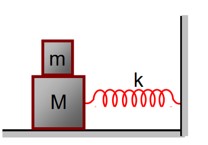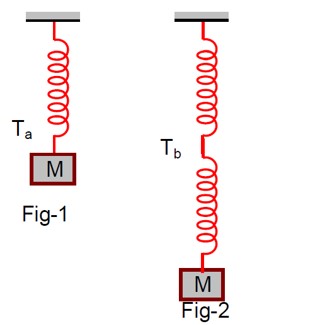A body is performing S.H.M. Then its
(a) Average total energy per cycle is equal to its maximum kinetic energy.
(b) Average kinetic energy per cycle is equal to half of its maximum kinetic energy.
(c) Mean velocity over a complete cycle is equal to 2 π times of its maximum velocity.
(d) Root mean square velocity is 1/√ 2 times of its maximum velocity
A body is performing S.H.M. Then its
(a) Average total energy per cycle is equal to its maximum kinetic energy.
(b) Average kinetic energy per cycle is equal to half of its maximum kinetic energy.
(c) Mean velocity over a complete cycle is equal to 2 π times of its maximum velocity.
(d) Root mean square velocity is 1/√ 2 times of its maximum velocity
This is a multiple choice answer as classified in NCERT Exemplar
(a, b, d) a) total mechanical energy of the body at any time t is
E= w2a2
KE=1/2mv2=
Kmax= ½ mw2a2=E
b) K= ½ mw2a2cos2wt
for a cycle value of coswt is =1/2
= 1/4 mw2a2= kmax/2
c) v=dx/dt = a coswt
Vmaen =Vmax+Vmin/2
= aw-aw/2=0
d)Vrms=
Vr
Similar Questions for you
Velocity of block in equilibrium, in first case,
Velocity of block in equilibrium, is second case,
From conservation of momentum,
Mv = (M + m) v’
f? = 300 Hz
3rd overtone = 7f? = 2100 Hz
Kindly consider the following figure
K = U
½ mω² (A² - x²) = ½ mω²x²
A² - x² = x²
A² = 2x²
x = ± A/√2
Taking an Exam? Selecting a College?
Get authentic answers from experts, students and alumni that you won't find anywhere else.
On Shiksha, get access to
Learn more about...

Physics NCERT Exemplar Solutions Class 11th Chapter Fourteen 2025
View Exam DetailsMost viewed information
SummaryDidn't find the answer you were looking for?
Search from Shiksha's 1 lakh+ Topics
Ask Current Students, Alumni & our Experts
Have a question related to your career & education?
See what others like you are asking & answering


